
Learning at the Sophia Faculty of Global Studies | Learning Global Studies at Sophia University
Leading to solutions from both global and local perspectives
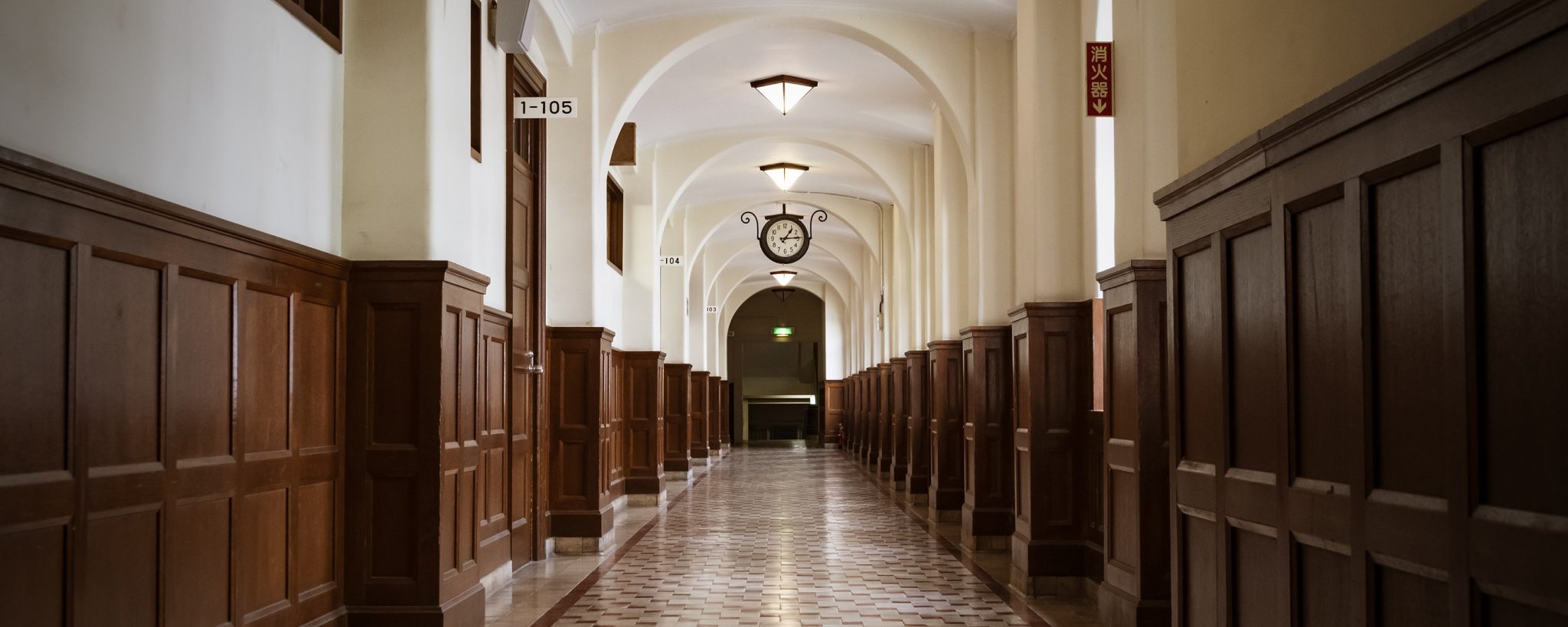
#Sophian
Students who study at the Faculty of Global Studies
The faculty looks at globalizing society not only from the perspective of a single country or region, but also from the angle of international relations overall, and incorporates the viewpoints gained in this process into regional studies, leading to detailed examination. The Faculty of Global Studies is positioned as a comprehensive one in the sense that students study international relations and regional studies together, crossing diverse regions of the world and various academic disciplines.
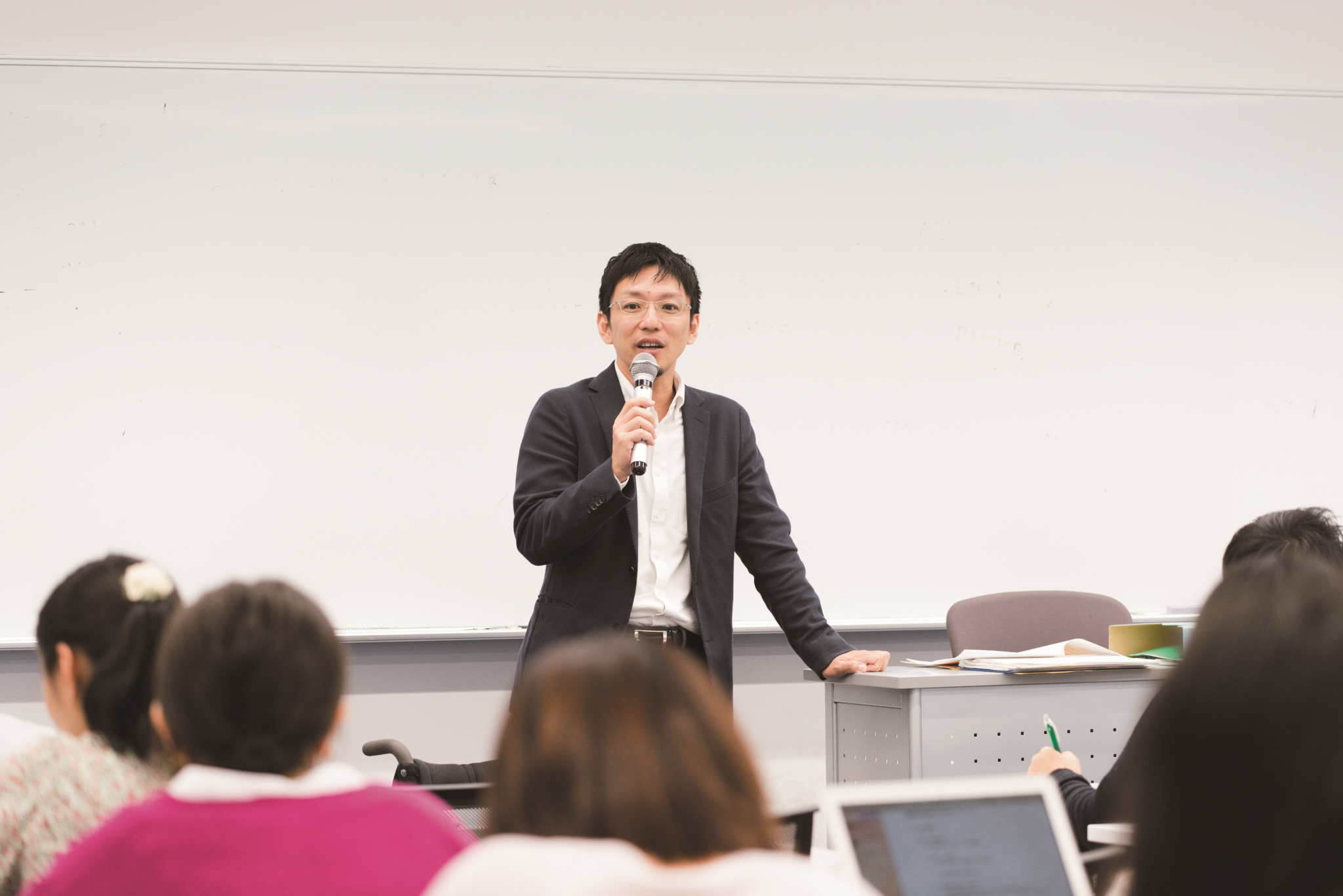
#Glocal
International Relations and Area Studies Perspectives.
The “Glocal” perspective, which combines a global (international relations) perspective that looks at the world from a broad perspective with a local (regional studies) viewpoint that examines regions in detail, forms the basis for learning. It is a concept that one’s own common sense and beliefs are not necessarily the same as those of others. The habit of thinking from the perspectives of different regions leads to new ways of looking at the world.
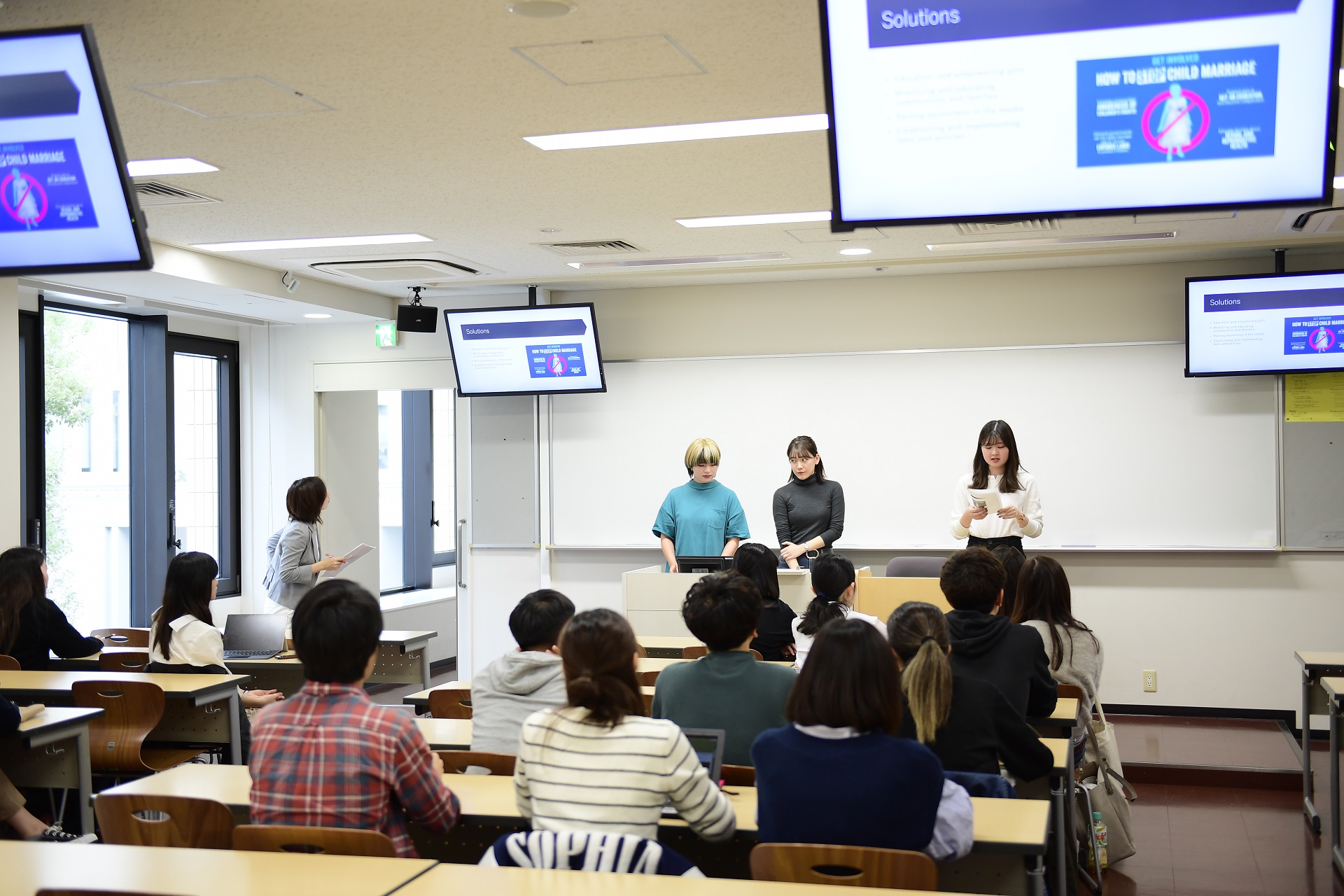
#Diversity and Inclusion
Accepting diversity
Through learning with a diverse group of their peers, students will become aware of how important it is to respect individuality. This will lead to a deeper understanding of the social background behind diversity in terms of religion, race, and ethnicity, and even the existence of a national framework. Students will be motivated by the stimulation and enjoyment of broadening their own thinking.
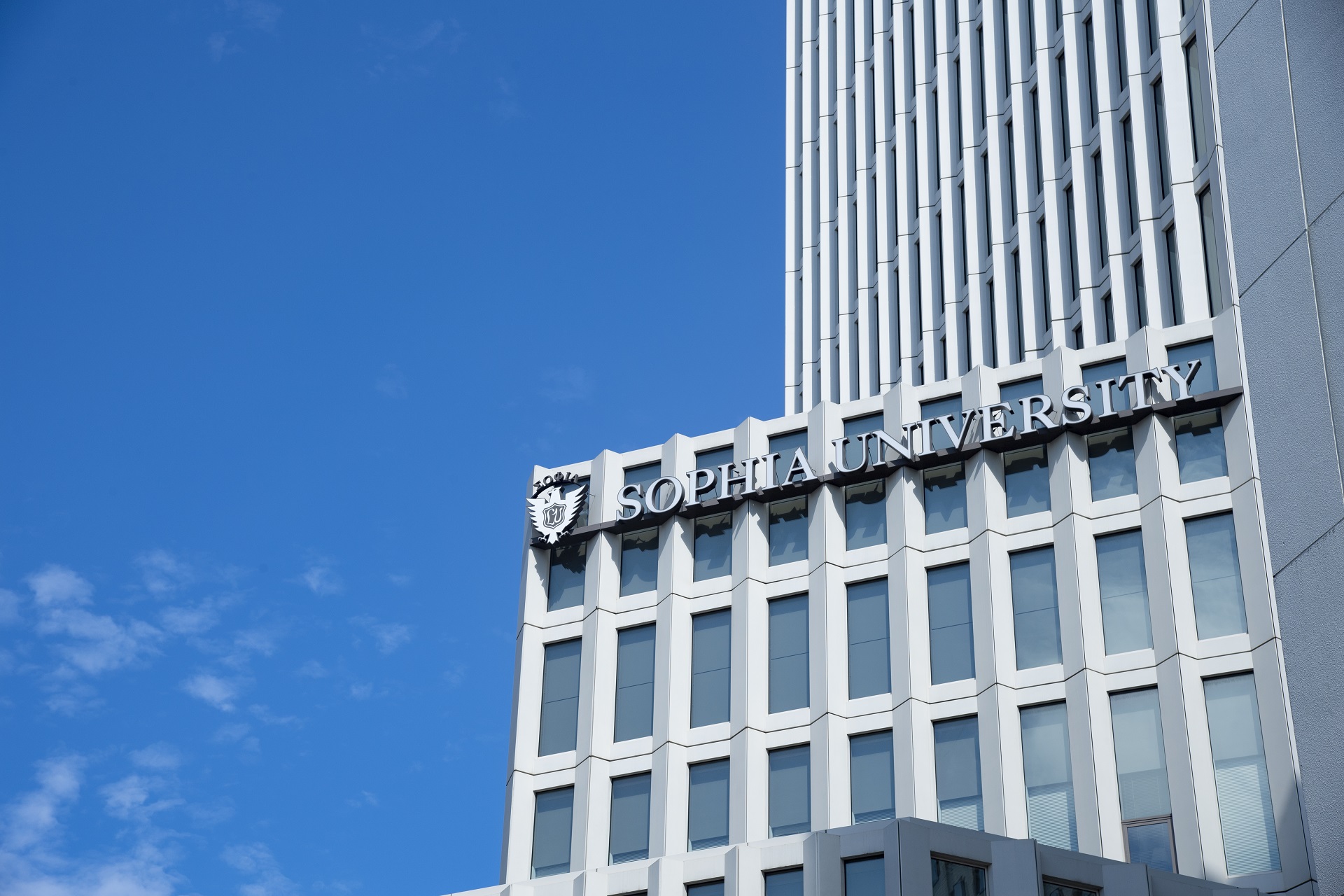
#Sophia Global Studies
What it means to learn Global Studies
How should we behave and how should we live in an increasingly globalized society? Such questions and curiosity are what give us the strength to face the world and increase the value of the knowledge we gain. The future is mirrored in the images of our senior students who have changed their way of thinking and experienced significant growth before and after enrollment.
About the Faculty of Global Studies
Academics and an environment to nurture “international public intellectuals”
Throughout its more than 100 years of history, Sophia University has built up a system and ways to enhance global competence. This includes an educational system based on values and perspectives that can be shared with people around the world, and a support system for studying abroad, both in specialized fields and in languages.
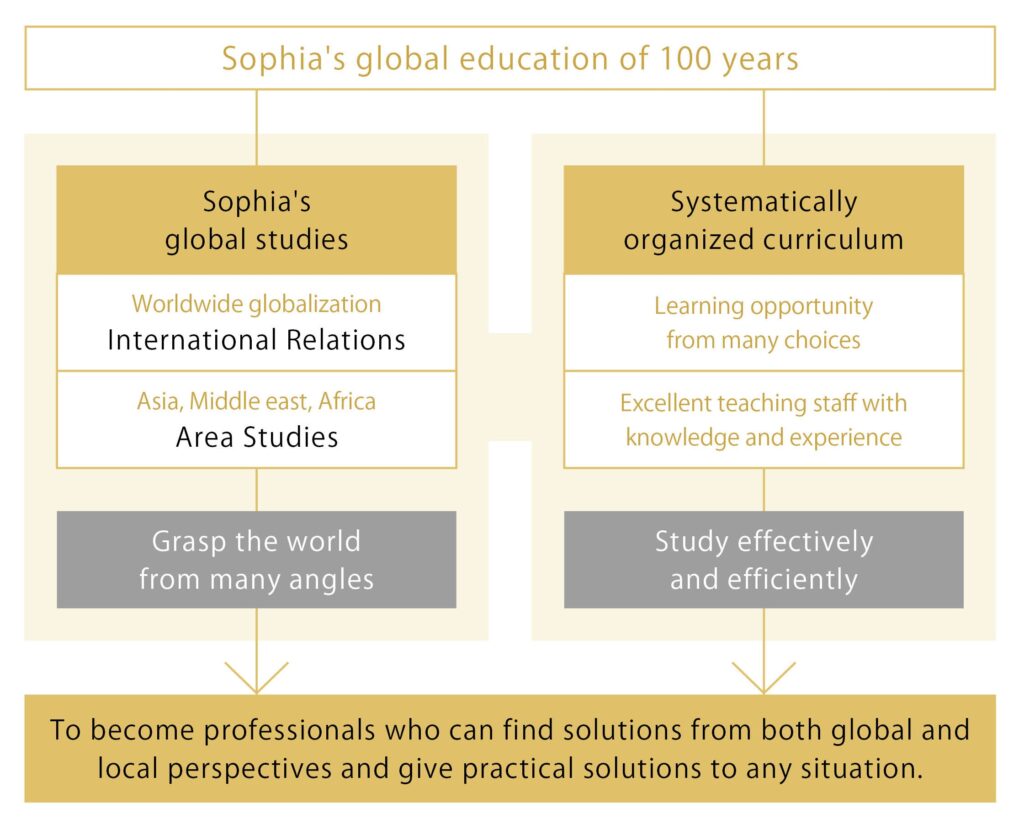
The Faculty of Global Studies (FGS) will nurture “international public intellectuals” through the effective and efficient acquisition of perspectives and theories to view the world from a three-dimensional aspect while taking full advantage of its century accumulated global education.
Educational Objectives and Policies
-
SPSF International Relations
To equip students, through systematic study of courses offered in the International Relations and Area Studies degree programs, with (1) understandings of globality, (2) understandings of locality, (3) proficiency in multiple languages (English and regional languages), and (4) negotiating skills grounded in ethical awareness.
SPSF Area Studies
To equip students, through systematic study of courses offered in the Area Studies and International Relations degree programs, with (1)understandings of globality, (2) understandings of locality, (3) proficiency in multiple languages(English and regional languages), and (4)negotiating skills grounded in ethical awareness.
-
To produce graduates (international public intellectuals) capable of addressing both positive and negative facets of globalization, and contributing to the development of a collaborative society in which all people of the world move forward in partnership.
-
SPSF International Relations
The Faculty of Global Studies sets standards for the skills and knowledge that students who aim to become international public intellectuals seeking to achieve a fair society that protects human dignity in the globalizing world today. Those who fulfill the graduation requirements shall be deemed to have acquired these qualities and will be awarded a diploma.
- An interest in social security, conflicts, poverty, development, immigrants, refugees, global environment, etc. and the ability to explain why such issues need to be solved globally.
- The ability to understand the approaches and overall theory of International Relations Studies and Area Studies and consider issues from both perspectives combined.
- The ability to shape problem-solving methodology analyze the positive and negative aspects of globalization in line with concrete case studies, using basic theories and demonstrative methods.
- The ability to set up and explore subjects combined with Area Studies, while specializing in International Relations, dealing with International Politics, International Sociology, Economics, International Cooperation, International Education, etc.
- The ability to engage in dialogue with various others who live in different parts of the world and to cooperate in solving problems for the creation of an inclusive society.
SPSF Area Studies
The Faculty of Global Studies sets standards for the skills and knowledge that students who aim to become international public intellectuals seeking to achieve a fair society that protects human dignity in the globalizing world today. Those who fulfill the graduation requirements shall be deemed to have acquired these qualities and will be awarded a diploma.
- An interest in social security, conflicts, poverty, development, immigrants, refugees, global environment, etc. and the ability to explain why such issues need to be solved globally.
- The ability to understand the approaches and overall theory of Area Studies and
International Relations studies and consider issues from both perspectives combined. - The ability to shape problem-solving methodology analyze the positive and negative aspects of globalization in line with concrete case studies, using basic theories and demonstrative methods.
- The ability to set up and explore a subject combined with International Relations, while
specializing in Area Studies, studying a specific region (Asia and the Middle East/Africa) within an international society where globalization is accelerating.The ability to set up and explore a subject combined with International Relations, while specializing in Area Studies, studying a specific region (Asia and the Middle East/Africa) within an international society where globalization is accelerating. - The ability to engage in dialogue with various others who live in different parts of the world and to cooperate in solving problems for the creation of an inclusive society.
-
SPSF International Relations
In accordance with the Diploma Policy, the Department of Global Studies constructs its curriculum with courses aligned with the following purposes:
- To have students study Global Studies and the basics of International Relations and Area Studies that support it in lectures, and thus acquire core theories and methodologies as well as fundamental research skills and approaches.【Course numbers 100-199】
- To have students understand the dynamics of international politics and economy, and learn in lectures about the mechanism of international cooperation and civil society, and thus prepare for selecting their specialties【Course numbers 200-299】
- To have students learn about Asia, the Middle East and Africa, etc. from the perspectives of history, culture, politics, economics, etc. in lectures and thus prepare for selecting their specialties.【Course numbers 200-299】
- To have students select one area of International Relations -International Politics or Civil Society and International Cooperation -and one from Area Studies, including the two branches, Asia and Middle East and Africa, and have them conceptualize and implement solutions to global issues through lectures, etc.【Lecture Course numbers 300-499】
- To have students actively set up individual research questions regarding globalization issues and present relevant research results in academic papers and other clear forms.【Self-motivated research: 200-299; Seminars: 400-499; Thesis and research: 400-499】
- To have students acquire a supportive attitude toward the theme-based research of other individuals through small-group seminars where they can deepen mutual understanding through debate.【Basic Seminar numbers 100-199; Seminars 400-499】
- To have students enhance their proficiency of English, the language commonly spoken internationally, by taking English-taught courses, as well as to acquire multilingual skills by encouraging them to learn foreign languages other than English.【Lecture Course number 200-】
SPSF Area Studies
In accordance with the Diploma Policy, the Department of Global Studies constructs its curriculum with courses aligned with the following purposes:
- To have students study Global Studies and the basics of Area Studies and International Relations that support it in lectures, and thus acquire core theories and methodologies as well as fundamental research skills and approaches.【Course numbers 100-199】
- To have students learn about Asia, the Middle East and Africa, etc. from the perspectives of history, culture, politics, economics, etc. in lectures and thus prepare for selecting their specialties.【Course numbers 200-299】
- To have students understand the dynamics of international politics and economy, and learn in lectures about the mechanism of international cooperation and civil society, and thus prepare for selecting their specialties.【Course numbers 200-299】
- To have students select two areas from Area Studies and International Relations Studies as their disciplinary specialties and have them conceptualize and implement solutions to global issues through lectures, etc.【Lecture Course numbers 300-499】
- To have students actively set up individual research questions regarding globalization issues and present relevant research results in academic papers and other clear forms.【Self-motivated research: 200-299; Seminars: 400-499; Thesis and research: 400-499】
- To have students acquire a supportive attitude toward the theme-based research of other individuals through small-group seminars where they can deepen mutual understanding through debate.【Basic Seminar numbers 100-199; Seminars 400-499】
- To have students enhance their proficiency of English, the language commonly spoken internationally, by taking English-taught courses, as well as to acquire multilingual skills by encouraging them to learn foreign languages other than English.【Lecture Course number 200-】
-
The Faculty of Global Studies welcomes students who will engage in proactive efforts to build on their intellectual interests and motivation, and endeavor to contribute to the creation of a global inclusive society, as described below:
- Those highly interested in the positive and negative dimensions of a globalizing world and have acquired a certain level of knowledge in high school classes associated with Modern Society.
- Those highly interested in the richness of human society and culture created by the diversity of regions and people constituting the world who have acquired a certain level of knowledge in high school classes associated with Geography and World History
- Those who can approach matters with evidence-based logical thinking and who have made continued efforts to address matters independently
- Those who bear the English skills to read and comprehend the basic literature required to understand globalization trends
SPSF (Sophia Program for Sustainable Futures)
Faculty of Global Studies:
SPSF Department of Global Studies